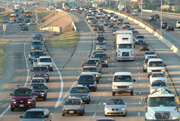Gridlock Getting Worse
 The 2005 Urban Mobility Report, measuring traffic congestion trends between 1982 and 2003 was released this past Monday, and showed that traffic congestion is costing Americans $63.1 billion per year. The report, released by the Texas Transportation Institute (TTI) demonstrated among other things that there is a growing list of metropolitan areas where commuters are delayed at least 20 hours per year. According to this article in the Detroit Free Press, gridlock continues to worsen:
The 2005 Urban Mobility Report, measuring traffic congestion trends between 1982 and 2003 was released this past Monday, and showed that traffic congestion is costing Americans $63.1 billion per year. The report, released by the Texas Transportation Institute (TTI) demonstrated among other things that there is a growing list of metropolitan areas where commuters are delayed at least 20 hours per year. According to this article in the Detroit Free Press, gridlock continues to worsen:There are 51 such places now, compared with five in 1982. Among some of the newer entries: Colorado Springs, Colo.; Virginia Beach, Va.; Charleston, S.C.; New Haven, Conn.; Raleigh-Durham, N.C.; Salt Lake City, and Cincinnati.
The authors contend that much of the problem has to do with a failure of urban areas to provide the capacity required to keep pace with growth. The time and money required to get back to a state of equilibrium further reinforces the depth and dimension of the problem, as reported here:
The American Association of State Highway and Transportation Officials estimated it would take as much as $400 billion in federal spending over the next six years to solve traffic problems, based on a 2002 study...Roads aren't being built fast enough to carry all the people who now drive on them, according to the Transportation Development Foundation, a group that advocates transportation construction.
The TTI suggests that problems can be addressed by better planning:
The release of the annual study by the Texas Transportation Institute comes at a time when the U.S. Congress is considering legislation to re-authorize funding for transportation programs and projects across the nation. The House-passed version of the six-year bill includes a Congestion Relief Program to address urban congestion problems. "The bill includes important sections dedicated to developing a strategy to improve mobility by attacking congestion in a systematic way using an array of traffic congestion relief activities," says study author Tim Lomax, a research engineer at TTI. Those include building more road and public transportation capacity, operating that capacity for the most efficient service, and innovative pricing and truck-only lane projects.
The proposals suggested to address the problem fall into what I can only call the "Abra-Cadabra" approach to planning - i.e. build it and abra-cadabra, problem solved. In fact solutions such as these fail to address the systemic problems that need to be addressed before we can meaningfully move ahead. Not once did this report or any of the other random articles I found on the web talk about telework, or a dispersed, web-enabled workplace. Anita Campbell's blog talks about Ross Mayfield, CEO of SocialText, who discusses "net-enabled bootstrapping" and how technology will create redundancies in real estate:
"I am convinced that being virtual is the best way to start a company. The benefits go beyond cost (although the culture of frugality can go a very long way). In our case, it improves the product. But generally it is more productive. When the bandwidth for collaboration is constrained at times, you gain a certain focus."
Until policy makers realize their proposed solutions have about as much long-term viability as the little Dutch Boy's solution to repairing leaky dams, the issue of traffic congestion will only get worse.
0 Comments:
Post a Comment
<< Home